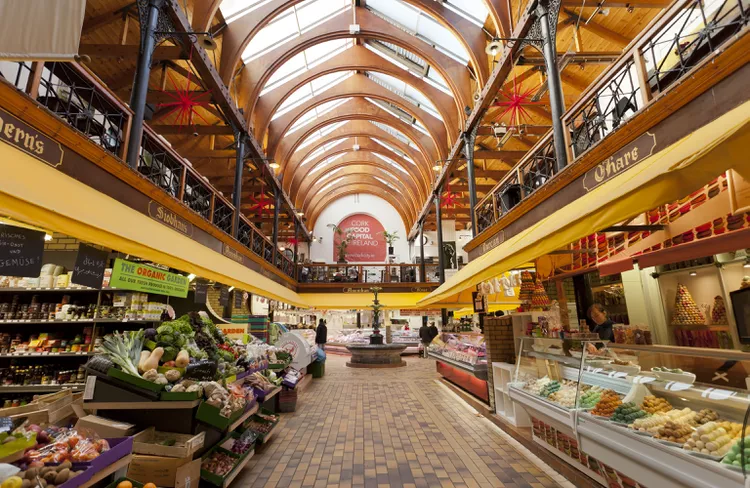Explore the English Market in Cork
Cork’s food market, known as the English Market, specializes in local Irish food, along with some international flavors. This two-story covered market, consisting of the Princes Street Market and Grand Parade Market, offers fresh produce, hot meals, and gourmet ingredients from Monday to Saturday.
History
The English Market has been an integral part of Cork’s city center since the 1780s. At that time, Ireland was governed by the British Empire, and the English corporation in power constructed the market, which opened its doors on August 1, 1788.
By 1840, a Catholic majority emerged in Cork, leading the new local government to establish another covered market on Cornmarket Street, officially known as St. Peter’s Market. However, the name “English Market” remained associated with the older food hall to distinguish it from the St. Peter’s Market, which was unofficially referred to as the “Irish Market.”
Throughout the 18th and 19th centuries, markets played a critical role in Cork’s economy. The rich farmland surrounding the city and its sheltered harbor positioned Cork perfectly for exporting meat and other foods. Consequently, the markets became renowned globally, particularly for the exceptional quality of their products, including Cork butter.
Initially, stalls in the English Market primarily sold meat, but they quickly diversified to include fish and fresh produce.
Although the Irish Market has since been replaced by Bodega Bar, the historic English Market continues to thrive. It has survived famines and rebellions, though it endured significant fire damage in the 1980s. On June 19, 1980, a gas explosion sparked a massive fire, nearly destroying the Princes Street Market. Fortunately, Cork Corporation undertook a meticulous restoration of the beautiful Victorian structure, transforming the upstairs into a café while preserving its original charm.
In another fire incident in 1986, eight stalls were destroyed, but trading resumed shortly after, and the market continues to operate today.
What to See and How to Visit
The English Market stands out not just as a food market, but as a vibrant reflection of Cork. It’s a perfect spot for shopping for local ingredients or simply enjoying the bustling atmosphere. This two-level brick market is also one of Cork’s finest examples of Victorian architecture, attracting visitors who admire its design.
At the English Market, traders offer a wide array of goods, from local seafood to international spices and condiments. There are numerous butchers, delis, and bakers represented among the stalls. Shoppers can source items for a traditional Irish meal, gather provisions for a picnic, find food souvenirs, or enjoy a light meal on-site.
For a true taste of local cuisine, consider dining at Farmgate Restaurant café. Located in the upper gallery, this eatery serves dishes crafted from ingredients sourced from the bustling stalls beneath.
The market operates from 8 a.m. to 6 p.m., Monday through Saturday. However, individual vendors may have slightly varied hours. The main entrance is conveniently located on Princes Street, right in the heart of Cork City.
Things to Do Nearby
Just outside of Cork City lies Blarney Castle, home to the renowned Blarney Stone. It’s regarded as one of the best castles in Ireland and remains a favorite among visitors. Dating back to the 15th century, the castle is famous for the myth that kissing its stones grants one the Irish gift of gab.
For a fun family outing, consider visiting Fota Wildlife Park, where children can explore and see a variety of animals in a naturalistic setting.
To witness the stunning landscapes of Ireland, make your way to Mizen Head, the most southwestern point in the country. Here, you can enjoy breathtaking sea views, walk along the famous footbridge, and explore the historical station house pivotal in developing transatlantic cable lines.





